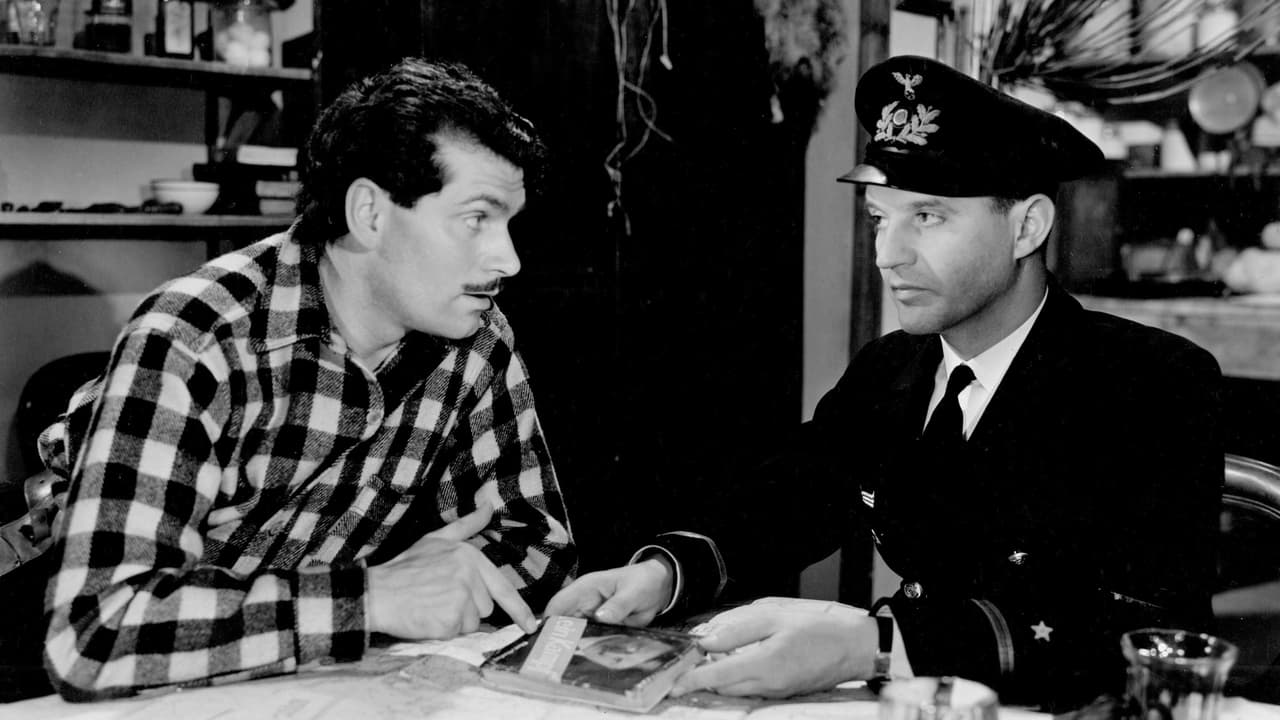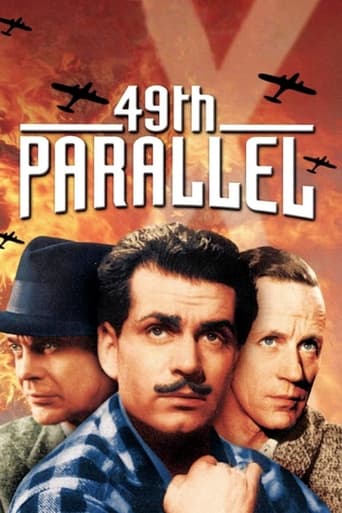

"49th Parallel" was the third film made together by Michael Powell and Emeric Pressburger after "The Spy in Black" and "Contraband". The title derives from the line of latitude which forms much of the American- Canadian border. Powell and Pressburger deliberately made it as a propaganda film, partly to highlight the Canadian contribution to the war effort but also to influence public opinion in the then neutral United States.In 1940 a German U-boat is attacking shipping off the Canadian coast. The captain n hopes to evade detection by hiding in a remote location in Hudson Bay, but the U-boat is spotted and sunk by Canadian bombers. A small group of survivors attempt to make their way across Canada to reach the American border. Along the way various members of the group are either killed or captured until only one, Lieutenant Hirth, remains.Much of the film was actually shot on location in Canada itself, taking advantage of the country's magnificent scenery. This had the effect of doubling the original budget of £60,000, but the film still ended up making a profit at the box office. A theme running throughout is the ethnic diversity of Canada, with French, British and German Canadians featuring alongside Canadian Indians and Inuit, referred to here as Eskimos. This ethnic diversity is contrasted favourably with the Nazi obsession with purity of blood; when the Germans try to turn the various ethnic groups against one another, as when Hirth tries to persuade a French-Canadian trapper that his people are being oppressed by the Anglophones, they invariably fail.Despite his German-sounding name, Pressburger was not a German but a Hungarian Jew with every reason to hate the Nazis. Despite this, his scripts are marked by a generosity of spirit often lacking in Allied- to say nothing of Axis- propaganda films. Although he did indeed hate Nazi ideology with a passion, he wanted to remind British audiences that the German people were capable of better things than Nazism and so his scripts often include at least one "good German". Here the "good Germans" are a Hutterite religious colony who have found refuge in Canada and who indignantly reject Hirth's attempts to recruit them to his cause and Vogel, one of the men under Hirth's command, who has a moral sense in which his comrades are lacking.Even the picture drawn of Hirth is not entirely negative. In many ways he is a typical Nazi- arrogant, fanatical, ruthless and blinkered. (Had he thought about it, he would never have tried to convert to Nazism the deeply religious, pacifist Hutterites, especially as several of them have fled to Canada to escape Nazi persecution). Yet he also has some admirable qualities- courage, resourcefulness, determination and the sort of never-say-die spirit more commonly associated in propaganda films with Britons than with Germans. Pressburger seems to be warning us that the Nazis are not just cowardly bullies and that with men of the calibre of Hirth on the other side the fight will not be an easy one.The film stars a number of well-known actors, some only in minor roles, who saw making films like this as part of their contribution to the war effort. It must be said that not all of these are at their best. Laurence Olivier is never convincing as the French-Canadian trapper, and Leslie Howard's upper-class English writer, who helps capture one of the Nazis, looks and sounds as though he would be more at home in a Bloomsbury salon than in the Canadian wilds. There are, however, good contributions from Eric Portman as Hirth, Niall MacGinnis as Vogel and Anton Walbrook as the Hutterite leader Peter, who delivers an impassioned anti-Nazi speech. Other excellent features include Powell's photography of the Canadian scenery and Ralph Vaughan Williams's musical score.The final scene, set at the border at Niagara Falls, can perhaps be seen as a veiled critique of American neutrality. Hirth, the only survivor of the group of Germans, succeeds in crossing into the United States aboard a train but is returned to Canada by a couple of resourceful American customs officers. Legally, Hirth is in the right; he has reached neutral soil and should be repatriated to Germany. Morally, of course, we are rooting for the customs men, two ordinary American citizens doing- or so Pressburger implies- what their government ought to be doing, namely refusing to remain neutral in the fight against Nazi tyranny.Had the film actually been shown in America in 1941 this might have been a controversial stance. In the event, it was not released in the States until 1942, by which time America had joined the war. Even then, some passages which it was feared might arouse controversy were cut, such as Hirth's description of black people as "sub-apes". This was cut not to avoid offending black Americans but to spare the feelings of white segregationists who might not have taken kindly to hearing views akin to their own in the mouth of a Nazi.It is now more than seventy years since the war ended, and propaganda films of the period can often have a very dated feel. Some, although ostensibly made in support of a righteous cause, can even seem offensive today; I am thinking of the likes of "The Purple Heart", with its all-too-obvious anti-Japanese bigotry, or "North Star", which attempts to whitewash Stalinism. "49th Parallel", however, is not one of these. Although it is (unusually for a British war drama) told mainly from the perspective of the German characters, Powell and Pressburger concentrate less on "reasons to hate the enemy" than on the positive values, such as democracy and tolerance, which we were fighting to defend. Some wartime dramas have looked outdated ever since 1945; this one remains timeless. 8/10
... View MoreA WWII U-boat crew is stranded in northern Canada. To avoid internment, they must make their way to the border and get into the still-neutral United States.Said Michael Powell, "I hoped it might scare the pants off the Americans." Screenwriter Emeric Pressburger remarked, "Goebbels considered himself an expert on propaganda, but I thought I'd show him a thing or two." After persuading the British and Canadian governments, Powell started location filming in 1940.Now, how effective the film was in getting America into the war, I don't know. Certainly not nearly as effective as Pearl Harbor ended up being. But what you do have is a great war story of Nazis in Canada. The plot has some questionable elements -- the Germans speak very good English -- but the idea of a war thriller is always good if you have the talent to pull it off like Powell does.
... View MoreIn the famed war movie "The Great Escape," a Allied soldiers escape from a prison camp and try to make their way to safety. We cheer them all the way. In "49th Parallel" we have the reverse: a group of six Nazis escapes the destruction of their submarine, and tries to escape through Canada to the USA. Along the way they murder, pillage, and destroy...and we boo them all the way across the continent and back.I was interested in this film because I have been familiar with the Vaughan Williams score for years, but never seen the images it was written for. "49th Parallel" starts slowly, almost like a war documentary. Then we're taken to a far-flung trapper's HQ, where we're forced to watch Laurence Olivier do a Pepe-le-Pew style French character. I almost gave up there, but then the plot started to thicken. Although there are several preachy, propagandistic spots in the film, there's a lot of action and character development as well, with a zinger of an ending. If you can make it through the first 30 minutes, the rest of the movie will reward you for your patience.
... View MoreSo sayeth one of the characters, Richard Armstrong Scott (played by Leslie Howard) and never have truer words been said of films in general and of this one in particular. WW2 has long gone but this celluloid gem remains and although filmed for WW2 propaganda this has not limited its continued enjoyment and appreciation. It is a superb commentary on the dangers of any ideology that demands total blind servitude of its followers and perpetrates cruelty and murder to attain it. The film is a stinging commentary on Nazism set against a back drop of the ordinary and human endeavours of people in Canada.The story opens with a German U-Boat off Canadian waters. The boat and crew require fuel and supplies to enable their return to Germany and so they select a remote part of Canada (Hudson Bay) to surface whilst 6 of the crew go on foot to a village to procure the necessities for the journey home. Disaster strikes when the U-Boat is traced and bombed to pieces by Canadian fighter pilots leaving the 6 men who reached shore stranded on foot and in enemy territory. Their journey to reach the USA, which was still neutral in WW2 at this point, is the main focus of the film and is told in 4 chapters: the pillaging at Hudson Bay; a sojourn at a German Christian community, the Hutterites; on foot going west where they encounter a writer researching the native Amerindians; and finally, a confrontation with a Canadian soldier on board a freight train travelling across Niagara Falls from Canada into the USA. During the course of the journey the 6 crew dwindle as they die or are arrested leaving just one of them trying to reach the US at Niagara.There are many stars of the era in this film and performances all round are superb even Laurence Olivier's turn as a French Canadian (resembling Gael Garcia Bernal when he sports a beard!) that sometimes raises eyebrows. There is some witty and perceptive dialogue and even though the Nazis sometimes get the better of the Canadians, the Canadians are given the greater voice. Some fine examples of this are:"You and your Hitlerism are like the microbes of some filthy disease.""I never would have believed that grown up men could behave like spiteful little schoolboys" (after a Nazi symbolically destroys a Matisse and Picasso)."One armed superman {the Nazi} against one unarmed decadent democrat." The chapter in which the Nazis hide out with the Hutterites is particularly poignant as one of the Nazis discovers to his astonishment that in the community people work because they want to support the community, not for financial gain. They work at whatever they enjoy and/or are skilled at. If they leave their community for any reason and return they are not punished but welcomed back. The contrast drawn between them and Nazi Germany is implicit. The importance of the Hutterite chapter is that this film is not anti-German but anti-Nazi.Watching the film 70 years since it was made one feels patriotism roused as well as hatred and fear of Nazism and what it represents; amazing as a piece of propaganda and marvellous as a film. Finally, this film served Canada and its peoples very well giving it and them a character separate from and distinct to the USA.
... View More